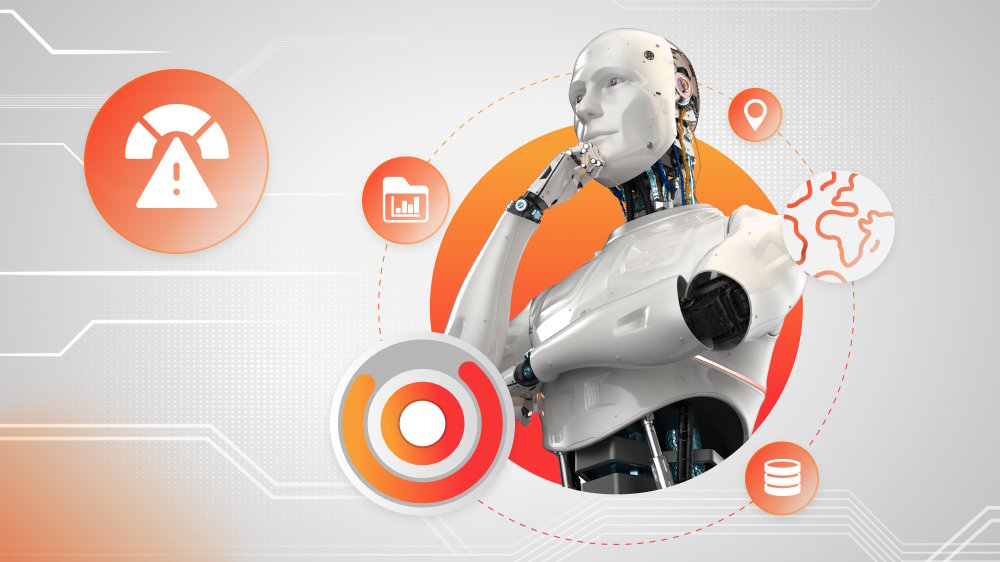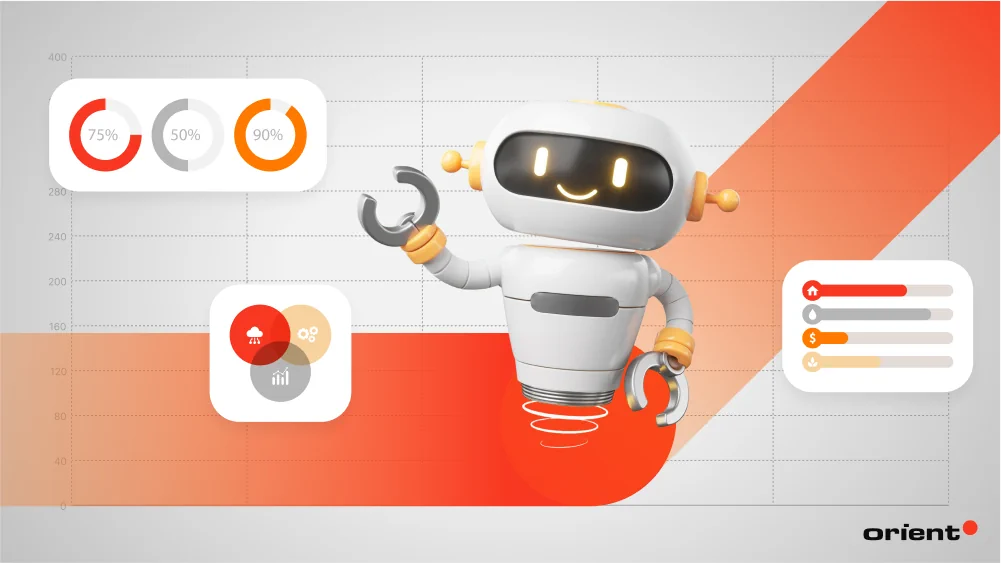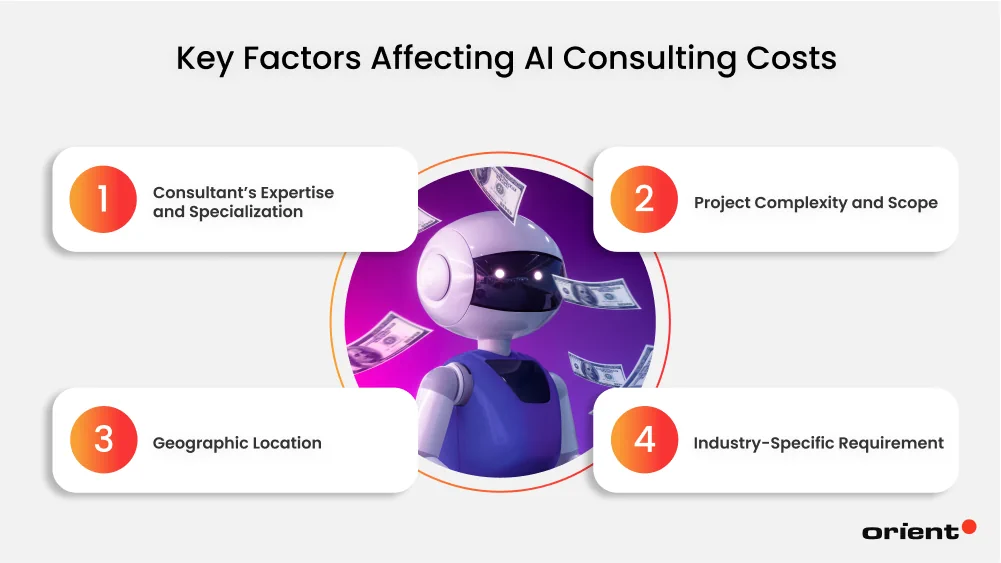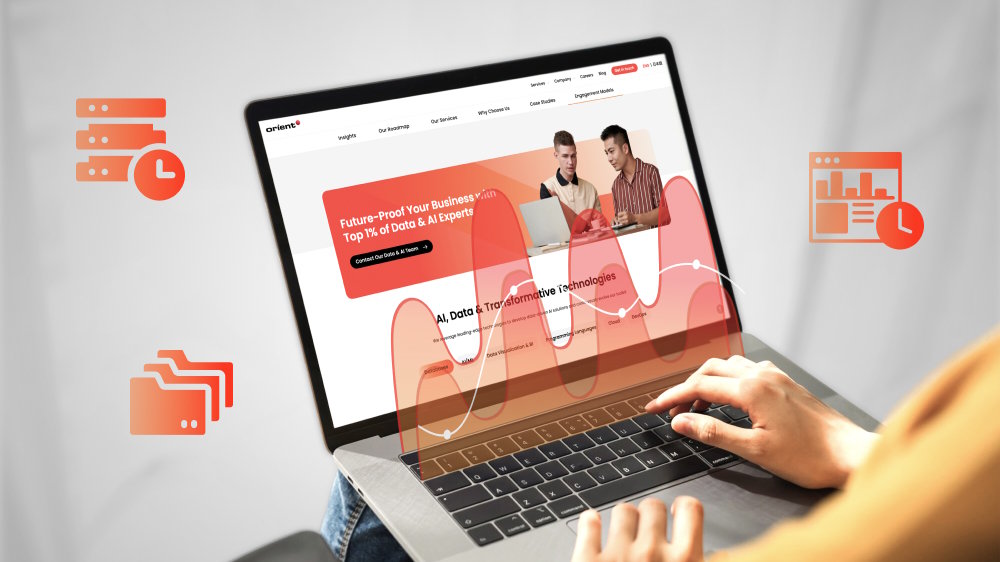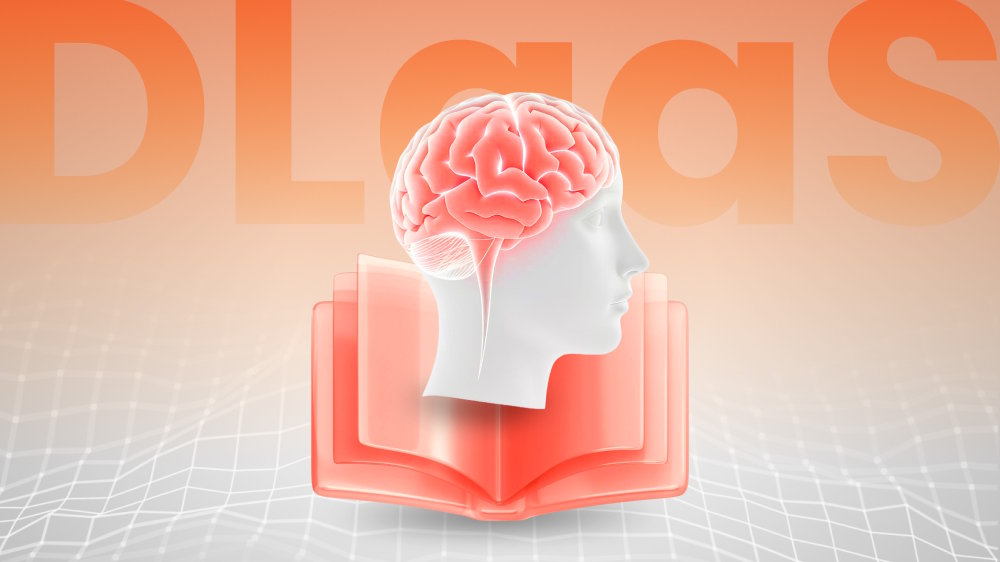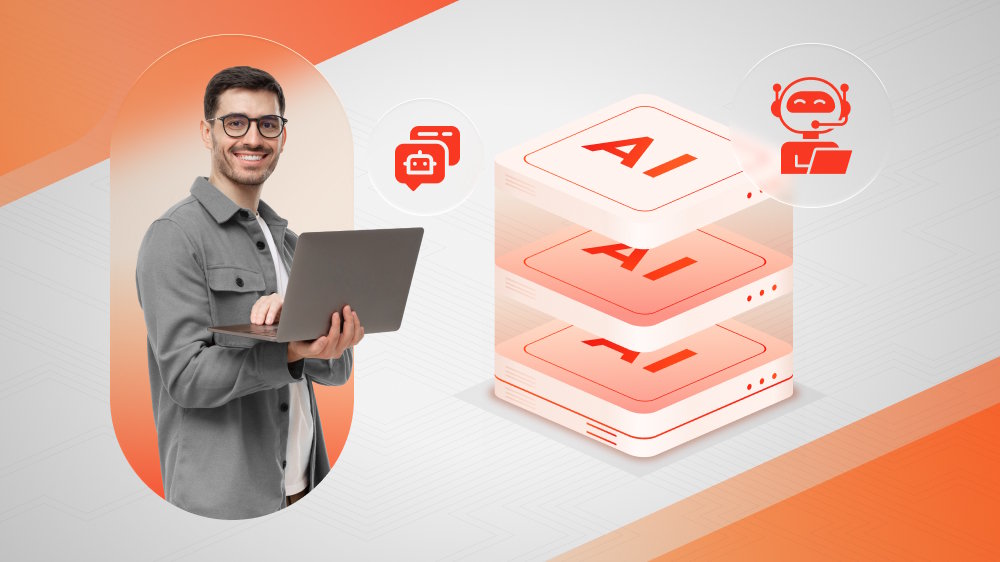The world of artificial intelligence (AI) is potentially faster than ever, which means that companies around the world are exploring the huge potential and the complexities that come along with the use of AI in their operations. This high demand has spurred an active and continuously growing AI consulting market.
When competition is high among organizations to adopt AI in their businesses, one question stands out in their minds: “What are the AI consulting rates, and how are they structured?” Knowledge of the cost of using AI expertise is the most vital in budgetary planning and the maximization of ROI. As the average amount of money that a company would spend on AI on a monthly basis would increase to the value of $85,521 by 2025 (which is 36 % higher than in 2024), pricing models need to be clearer than ever.
This article seeks to demystify AI consultant hourly rate, project, and retainer-based pricing plans. We shall explore the details of any of the common price structures, offering an insight into average rate levels, which are anything between $100- $150/hour in the case of a junior consultant or $300 to $500+ per hour in the case of the most sought-after professionals. Making your way through these models will enable you to find the necessary expertise with the possibility to match the prices, providing your AI journey with the finances and high-level innovation.
Navigating the AI Consulting Landscape
![Navigating the AI Consulting Landscape]()
The diverse range of AI solutions, which include machine learning consulting, natural language processing, computer vision, and advanced robotics, presents a challenge so broad that not many in-house teams have the overall knowledge needed to independently make their way through this maze. Thus, external AI consultants have proved to be unavoidable advisors, bringing strategic support, technical skills, and implementation assistance that are critical to the effective application of AI.
Nevertheless, the increasing use of AI consultants is the cause of another problem, namely, understanding the costs related to these services. In contrast to traditional IT services that have more standard prices, AI consulting rates can vary significantly, which causes confusion and creates a non-clear picture among any businesses willing to invest. This is due to the wide range of factors, such as the technical expertise of the consultant (e.g., deep learning experts may be more in demand and are consequently more expensive than regular data analysts), their level of experience, the complexity and scale of the project being worked on, and even geography.
In the absence of a proper structure for assessing such expenses, there is a threat of either overspending on services not appropriate to the organizations or underspending, which results in less-than-ideal AI deployment.
Key Factors Affecting AI Consulting Costs
The price of an AI consulting service is not a static figure; it’s a dynamic estimate that depends upon a combination of determinative factors.
![Key Factors Affecting AI Consulting Costs]()
Consultant’s Expertise and Specialization: The expertise and specialization of the consultant are the most determinant of the AI consulting rates. Junior consultants will be in the range of $100-$150/hour, but senior experts or niche specialists (especially those with experience with generative AI or reinforcement learning) can cost up to $300-$500+ per hour, with a 20-30% premium on the most advanced abilities. Specifically, proven firms of high-impacted AI implementations are often able to charge premium prices, as they can bring strategic value to the organization and alleviate the risk associated with implementation.
- Project Complexity and Scope: An easy AI integration, like the deployment of a chatbot with the use of pre-trained models, may cost between $10,000 and $50,000, whereas a complex supply chain predictive analytics system might require a special cost of more than $500,000 due to custom algorithms, massive data cleaning and preparation, and strict model validations. The more complex the issue, the longer it takes and the more expertise to fix, which directly increases prices.
- Geographic Location: The emergence of remote working seems to have flattened the playing field a little, but geographic location does matter when it comes to consulting rates in AI. Living costs and the concentration of demand on high-level talent tend to be higher in large technology centers and metropolises like Tokyo or Silicon Valley, which is why rates there are inflated. The availability of consultants in areas where their costs of operation are lower may provide better rates such that remote engagement can be a great option in situations where organizations are looking to manage their budget but not at the cost of quality, so long as issues concerning communication and time zone differences are addressed properly.
- Industry-Specific Requirement: Healthcare, finance, or defense industries with strict regulation, in which data privacy (e.g., GDPR, HIPAA compliance) and strict compliance with regulations become the priority, typically demand regulators with specialized knowledge of such regulatory environments. This specialist domain knowledge typically attracts a higher fee, given the greater responsibility and sophistication of working in such a setup. For instance, a consultant for bank fraud detection with skills in AI will be more expensive than a generalist as they are aware of higher-end financial regulations and security procedures.
In order to meet such assorted project needs and client demands, AI consulting is normally provided through three major pricing plans, including hourly, project-based, and retainer options. Each of them will be examined in detail in the following sections to give you a better idea of the specific breakdown of each and help you figure out which one may be most appropriate in regard to your specific AI initiatives.
The Hourly Rate Model: Paying for Time
A time-based structure is perhaps the simplest and most familiar pricing metric in consulting, and AI consulting is not an exception. In this model, clients pay as the actual time an AI consultant works on its specific project, which is normally charged in 15-minute or 30-minute increments. This implies that the client is billed on an hourly basis (or a fraction thereof) for working on activities like data analysis, model formulation, algorithm tuning, strategic planning, meeting with the client, research, and documentation. The consultant is so diligent in timekeeping that they use project management software or time-tracking software and give their clients detailed time logs during invoicing. The model provides a fine-grained perspective of effort in use, where the payment is directly associated with possible work hours instead of unique pre-determined results.
![The Hourly Rate Model: Paying for Time]()
Typical Rate Ranges
As of mid-2025, AI consulting hourly rates are based on a developing marketplace, demand for particular skills, and the background of the consultant. Although exact figures will fluctuate, approximate ranges make a fair measurement:
- Junior/Entry-Level Consultants: These individuals usually have direct experience in the field of AI at the level of 0-3 years. They may well be skilled in established machine learning libraries, data preparation, or aiding senior consultants on bigger projects. Their rates per hour are normally about $100-$150. They are suitable for baseline data work, preliminary literature searches, or complementing specified developmental sprints.
- Mid-Level Consultants: With 3-7 years of experience in AI, mid-level consultants will be able to independently design and implement particular AI models, manage smaller projects, and drive relevant contributions to high-level business strategy. They also tend to specialize in areas such as natural language processing (NLP), computer vision, or predictive analytics. They generally charge fees between $150 to $300 per hour.
- Senior/Expert Consultants: These are the seasoned veterans who have 7+ years of broad AI experience and are most likely to have advanced degrees, and have a track record of successful, complex AI application deployments. They are in demand as strategic leaders, end-to-end architecture designers, problem solvers of complex issues, and advisors of strategic AI projects such as bringing generative AI into enterprise systems. Their hourly rates may go up to $300 to $500+, and in the case of the most highly specialized or recognized thought leader, even higher fees, especially in niche skills where the demand is high.
- Agency vs. Independent Freelancer Rates: One must be cautious when making a distinction between agencies and independent freelancers. AI consulting agency rates are usually higher than those of independent freelancers by 20-50%. This margin accounts for agency overheads (e.g., sales, marketing, project management, administration support, office space), a broader base of diverse talent to source, and quick team scaling. While a solo senior freelancer might charge $350/hour, an equivalent consultant from a top agency might be charged $450-$550/hour. Agencies provide a structure, a filtering process, and typically project guarantees, which are factored into their costs.
Pros for Clients
The hourly rate model has significant benefits, specifically on specific AI engagements:
- Flexibility for Evolving Scopes: AI projects, particularly during their early exploratory stages, have less definite or flowing scopes. The hourly model gives a business an opportunity to change priorities or explore a new area in more depth without renegotiating a fixed contract each time. Such agility is very important in working with new AI applications where the route to a solution is not necessarily obvious at the start.
- Transparency in Time Allocation (with proper tracking): When consultants track their time diligently and maintain elaborate activity logs, clients can appropriately understand how their money is being utilized. Such transparency can put a lot of trust in the hands of the client and also ensure that the client does not end up paying a fixed fee that might possibly be higher than the amount actually put into their project. The constant monitoring can be done by regular updates and time reports.
- Ideal for Smaller, Undefined, or Exploratory Projects: The hourly rate is usually most fitting to initial AI feasibility studies, developing proof-of-concepts, getting a quick analysis of an AI question, or where the scope of the project is purposely iterative and discovery-oriented. It enables its clients to mobilize expertise only as long as they require in order to spend the minimum amount of money before it becomes evident how to proceed with project goals.
Cons for Clients
Regardless of its flexibility, the hourly rate model also has its share of challenges the clients should be aware of:
- Uncertain Total Costs: The biggest disadvantage is that there is no assurance regarding costs. Also, in hourly billing mode, it is possible to exceed budget should the project be far more complicated or require more time than it was planned initially; this is if the project overruns its time and scope. A project that is originally estimated to take 100 hours can easily go up to 150 or 200 hours, hence costing much more.
- Potential for Scope Creep if Not Managed Effectively: Flexibility, which would otherwise be its pro, could turn out to be its con. Projects may grow over time out of intention due to a lack of strict project management and continuous alignment of the project scope. Each new request or new idea, though possibly worthwhile, increases the number of billable hours and can easily exceed any expectations put forth early in the project unless regular communication and formal change orders keep it under control.
- Less Incentive for Consultant Efficiency (Perceived): Though professional consultants will offer value and are willing to get paid per hour, others may feel that an hourly system does not offer an incentive to the consultant to work efficiently because the more time they work, the more they earn. This understanding (accurate or otherwise) creates the need to have effective client management, define milestones well, and frequently monitor progress to be productive and meet the objectives of the project.
The Project-Based Model: Fixed Price for Defined Deliverables
The project-based model, commonly known as fixed-price or fixed-scope, lies on the principle of a fixed single-cost determined by a well-defined number of deliverables. In this arrangement, the AI consultant or agency might put forward a detailed proposal of what or how they expect the results to be in the end, milestones, timelines, and what/how both parties will be required to do. On acceptance of such a fixed price, the price stands steady irrespective of the number of hours required of a consultant on the project, as far as the scope is not altered. This model works well with openness and understanding beforehand in that the client and the consultants will be on the same wavelength as to the ultimate goal of the project and the road it must travel.
![The Project-Based Model: Fixed Price for Defined Deliverables]()
Typical Project Price Ranges
- Small Projects (e.g., AI strategy assessment, chatbot pilot): These projects include limited data sources and employ pre-trained models or low-code platforms. The cost of such projects tends to fall between $10,000 and $50,000. Their features are a limited period of time (several weeks to 3 months) and a narrow, well-defined scope.
- Medium Projects (e.g., specific ML model development, data pipeline setup): Those projects need moderate customization of the project, integration with the existing setup, and some model training. Typically, these projects are between 3 and 6 months, and the cost is between $50,000 to $250,000. They usually include a small group of data scientists and AI engineers.
- Large/Enterprise Projects (e.g., full-scale AI system implementation, digital transformation): This is a complex architecture, cross-functional coordination, and performance infrastructure. The average cost of such major projects is estimated to be $250,000 to over $1,000,000 and may take between 6 months and several years. They are usually multidisciplinary, highly integrated with legacy systems, and change management is huge.
Pros for Clients
- Cost Predictability and Budget Certainty: Clients can plan their budget with a fixed price agreed upon in advance. This is particularly useful in such organizations where financial management is tight or are funded via grants.
- Clear Deliverables and Milestones: Project-based contracts usually involve elaborate timelines, KPIs, and acceptance criteria. This transparency controls the expectations and makes us accountable in the course of the engagement.
- Encourages Consultant Efficiency to Meet Deadlines: Consultants get a fixed contract fee so they have the motivation to work efficiently and complete tasks in a timely manner. Delays or inefficiencies do not lead to extra billing, which aligns both sides to the same interests.
Cons for Clients
- Lack of Flexibility for Scope Changes: The flexibility to change a scope due to adding new features or sources of data typically needs to have a change order, which will take time and inflate the cost.
- Risk of Overpaying if the Project is Completed Faster: Even if results are achieved before the schedule provided or below the estimated cost, the client will pay the full value agreed. This may be inefficient unless the value added is more than the expectations.
- Requires Detailed Upfront Planning: To prevent misunderstanding, clients have to take time to scope the project. This involves the articulation of technical requirements, data availability, and success measures, which can involve internal alignment and external advisory services.
The Retainer Model: Ongoing Support and Strategic Partnership
Retainer model AI consulting takes the fixed monthly fee pricing format, which pegs the client to access the services of a consultant or group of consultants for a defined number of hours or continuous services. Retainers focus on strategy and continuity, unlike hourly or project-based models. Contracts usually run for 3-12 months, and consultants may offer advisory services, model maintenance, incremental growth, or executive coaching. This model is best suited to businesses that need regular access to AI professionals but are not willing to renegotiate the terms of collaboration each time a task or initiative is carried out.
![The Retainer Model: Ongoing Support and Strategic Partnership]()
Typical Retainer Price Ranges
- Basic Advisory/Maintenance (e.g., 5-10 hours/month): This level fits startups or SMEs that either keep in operation an already implemented AI system or require continuous, expert input on a regular basis. Light-touch support, including model performance reviews and checks and strategic check-ins. The cost of this support can be between $1,500 to $5,000 per month, depending on the hourly rate of the consultant and expertise.
- Standard Support/Development (e.g., 10-25 hours/month): This mid-tier retainer provides more consistent support for ongoing AI development, data pipeline optimization, or dedicated support for an existing AI system. Such a level tends to charge between $5,000 to $12,500 per month. It would be perfect to sustain the momentum on AI projects without making a commitment of full-time employment.
- Comprehensive Partnership (e.g., 25+ hours/month, dedicated team): At the extreme service end, this retainer implies full-stack AI support and assistance, such as dedicated data scientists, engineers, and strategic advisors. It is appropriate for companies that are in the process of digital transformation or expanding the use of AI throughout the organization. Rates on such full scale retainers start at $12,500 and can easily exceed $30,000+ per month as there is a serious investment of senior resources and constant high-level attentions.
Pros for Clients
- Dedicated Access to Expertise: Clients get the top billing when getting to consultants with long-term experience who get to know their systems, objectives, and issues, and hence there is less time wasted when training and more conversance.
- Smoother Collaboration and Deeper Understanding of Business: Long involvement makes trust and resonance possible. Institutional knowledge allows consultants to make more subtle suggestions and address issues before problems occur.
- Predictable Monthly Costs for Continuous Support: It is easy to budget, as monthly fees are fixed. This predictability is particularly desirable to the finance teams dealing with multi-quarter AI projects.
- Active Problem-Solving and Strategic Advice: Retainer consultants often provide more than reactive guidance and advice, giving insights into developing technology, competitive pressures, and optimization at the earliest stages before problems multiply.
Cons for Clients
- Potential for Unused Hours if Workload Varies: Clients may not use their retainer hours when inner priorities have changed or when a wave of AI-dependent work requests subsides, forcing them to incur unallocated costs.
- Less Focus on Specific, Short-Term Deliverables: Retainer contracts are based on long-term value rather than specialized results. The model is less applicable to clients who want an imminent, concrete output without combining it with milestone tracking.
- Requires a Strong, Trust-Based Relationship: Since retainers will work on a long-term basis, success is determined by faith in one another and open communication. Inconsistency in expectation or promptness can destroy the value in a short period.
Choosing the Right Model: A Decision Framework
The wrong pricing model can drive costs over budget, fall short of your expectations, or return less than the best on your investment in AI. The following is a guide to help your decision-making.
Internal AI Capabilities and Resources
It is important to first objectively assess your capabilities and limitations on the matter of AI in your own organization, before engaging external AI consultants.
The project-based (fixed-price) model may be an adequate choice if your team has good data engineering experience, comprehends the project management of AI projects, and has well-defined problems. You will be able to offer a close-knit extent, and your group will have the capacity to take care of what the consultant delivers and consolidate the arrangements. Alternatively, the retainer model can be useful to you when you require highly specialized expertise to solve complex problems that your competent in-house staff cannot address, such as with narrow bot fine-tuning or a part-time AI leader mentoring your current staff.
When the organization in question is new to AI or does not have experienced data scientist staff and the problems are vaguely defined, the best option available will be an hourly rate model covering the initial exploratory stages. This provides flexibility since the project scope gets clearer. When a particular project has been identified, you may move on to a fixed-price model. You can also start with an advisory approach report after report with a retainer approach, which is consultative in nature and can be well advised to slip into long-term strategic planning or slowly develop internal capabilities.
Key Questions to Ask Potential AI Consultants
The pricing model is also based on the transparent and malleable consultant. The five key questions to ask when evaluating are here:
1. What is your usual cost of pricing projects of this kind?
The potential answer to this question can help to clarify whether the consultant is inclined to charge an hourly rate, a fixed fee on projects, or billing on a retainer. Request to know how past engagements of this nature were priced and examples.
2. What are the hidden costs of AI consulting services?
Costs associated with AI projects are not always obvious, like cloud computing costs, data labeling, compliance audits, or the use of third-party APIs. Consultants ought to put a full disclosure of these. Any absence of transparency in such an area may result in budget overruns—particularly in those models that do not factor in the cost of the infrastructure.
3. Is it possible to give a breakdown of costs?
Ask for a line-item quote covering labor, equipment, facility, and contingency allowances. This is of the essence, especially in project-based pricing, because once there is clarity in deliverables and associated prices, it is easier to match. In an hourly or retainer rate, request information asking how the hours will be divided between the tasks.
4. What will happen when the scope alters?
The AI projects are also prone to scope creep due to the changing quality of data or business objectives. Know how the consultant manages change order, re-scoping or increased billing. The project-based model can be a block to formal amendment, whereas the hourly model can absorb a change more flexibly but at a cost.
5. What is your system of monitoring and reporting progress/hours?
Hourly and retainer models cannot be monitored without the use of effective tracking. Ask whether the consultant has applications such as Harvest, Toggl, or Jira to track time and progress. ROI can be evaluated with the aid of transparent reporting that guarantees accountability. In the case of project models, ask for milestone updates based on deliverables.
Maximizing Value from Your AI Consulting Investment
Hiring an AI consultant is a strategic step, and merely paying their fee does not guarantee success. For your AI consulting investment to reap the full payback, there must be a proactive and strategic initiative.
Building Internal Capabilities through Knowledge Transfer
AI consulting cannot and must not be a black box: they must require formatted knowledge transfer to enable internal teams. This is in the form of practical training, writing, and collaborative work patterns. An example of such an activity would be when consultants would co-develop models with in-house data scientists, hold workshops on prompt engineering, or develop reusable templates to be utilized when working on a project in the future. It is also possible to align traditionally tacit knowledge to be codified through AI-enabled platforms, allowing young employees to be exposed to the processes of the expert staff. When knowledge transfer is a priority, companies develop resilience, minimize reliance on third-party vendors, and speed up the innovation cycle. After solving the problem, a good consulting experience should also be characterized by a brighter, more competent team.
Diligence in Consultant Selection
Selecting an AI consultant is a practice that demands severe due diligence. Check their deep expertise in the field, communication style, and pricing clarity beyond technical certifications. Request a parameter of cost items such as infrastructure, licensing, and follow-up cost, as well as clarifying the process of dealing with the scope change.
In order to maximize the potential power of AI, companies are supposed to invite strategic alliances with reputable consulting duos such as Orient Software. Having made a name in the sphere of software development and development services, Orient Software is also focused on AI development services, such as generative AI, machine learning, NLP, and computer vision, and is ready to develop custom solutions that will help you derive all the benefits of AI in your business. We will make your AI journey successful since we provide transparent communication, high-quality deliverables, and client satisfaction.
